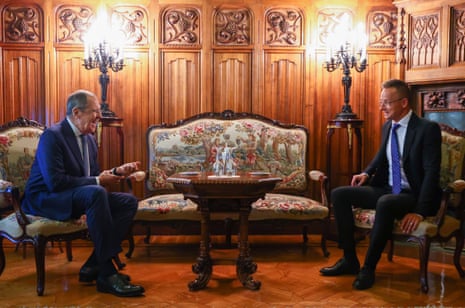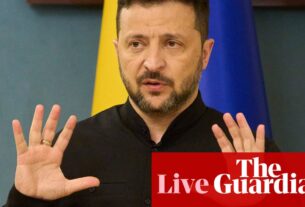EU sanctions policy ‘failed’ to make impact on Russia, Hungary’s foreign minister says
Péter Szijjártó, a frequent visitor to Moscow despite the continuing Russian aggression against Ukraine, also told Bloomberg that the EU’s sanctions policy “has failed” as he claimed it “hit European economy more than the Russian economy”.

He said that Hungary’s view on rolling over the existing sanctions will “depend a lot on … the geopolitical circumstances”, with Budapest closely following the progress of Trump-led talks with Russia.
“The world has become a safer place in the last couple weeks just because of these negotiations, because although we don’t know whether peace is going to be made on the short term or medium range or long term, but … the risk of escalation of the war [has been decreased] by the fact that the Russians and the Americans are in direct negotiations … and this is good news for us,” he argued.
Confronted about his trips to Moscow, he said he wished others had done the same, arguing “the only way out of this war comes through negotiations”.
Szijjártó said that Hungary remained closely linked with Russia because of energy imports, criticising other neighbours for not investing enough in their infrastructure to create rival route for supplying energy.
“Russia has been a reliable partner, so far, when it comes to energy deliveries. No one gave us a better offer, a more reliable and cheaper offer … so we are obviously … in a fair cooperation with them and we cannot give it up under the current circumstances,” he said.
But he insisted that despite significant policy differences with Brussels on its push for “a federalistic super state directed by and from Brussels,” Hungary remained a committed member of the European Union.
Key events
Hungary’s foreign minister blames EU for failing to proactively engage with Trump on tariffs
Back to tariffs, Hungarian foreign minister Péter Szijjártó was on Bloomberg TV earlier today, blaming the European Commission for failing to prepare for and negotiate against Trump’s measures and pushing against the bloc’s plans to retaliate.
He said that Hungary had a “concrete proposal” for talks with the US focusing around the automotive industry with a unilateral move to decrease EU tariffs on automotive imports to win Trump’s good will – but was ignored by the commission.
“These kind of challenging times show very clearly that the institutions in Brussels are not able to lead,” he argued.
Szijjártó said that Hungary could not enter into narrow negotiations with the US as trade falls under community competences for the commission, but he confirmed there were advanced talks about a broader “bilateral cooperation framework which includes economic elements,” as he stressed Hungary was on “very good terms” with the Trump administration.
And just like that, the German news agency dpa says that Merz cancelled his scheduled appearance at the Young Union’s reception in Berlin tonight, reportedly saying the focus is on finalising the coalition talks instead.
It was meant to be his first public appearance in days, but turns out we won’t hear from him tonight there.

Jakub Krupa
That point about deferring the decision on future resettlement to the next government is important here as the coalition forming process is drawing out a bit, with questions about whether the expected chancellor, Friedrich Merz, will meet the self-imposed deadline of having a government in place by Easter, which falls on 20 April.
The two main powers – the conservative CDU/CSU and the Social Democrats – are under increasing pressure to finalise their talks as the far-right Alternative für Deutschland continues to rise in polls and, at 24%, is level with Merz’s election winners according to the latest polls published over the weekend.
45 days after the election, the two parties are still locked in fraught talks over the next government’s programme, with some fearing the eventual compromise will not be satisfactory to either side’s voters.
In recent days, even the youth arm of the CDU in Cologne criticised Merz for lengthy talks and giving in to too many demands from the SPD, prompting fears that this could further fuel disillusion among some voters and help the AfD push ahead with its narrative and come top in the polls.
Further talks are expected tonight, and Merz will be hoping to have them concluded by the end of the week.
I’ll keep an eye on this for you.
Germany temporarily suspends resettlement of UN refugees, German press agency dpa says
Germany has temporarily suspended accepting new refugees via a UN resettlement programme, pending the outcome of the coalition negotiations and the new government formation, the German press agency DPA reported.
The DPA’s report said that almost all resettlement applications will be suspended until the new government takes office, with only “well advanced” cases expected to be processed.
DPA noted that German previously committed to offer support for 13,100 refugees in 2024 and 2025, with 5,061 people using the scheme so far.
EU’s von der Leyen speaks with China’s Li Qiang on trade and ‘avoiding further escalation’
European Commission president Ursula von der Leyen spoke with Chinese premier Li Qiang about “the responsibility of Europe and China … to support a strong reformed trading system” and push for “a negotiated resolution” to current trade disruptions.
The EU’s readout said she stressed “the need to avoid further escalation” after a heated exchange of words between Beijing and Washington on potential extra tariffs.
She also “emphasised China’s critical role in addressing possible trade diversion caused by tariffs, especially in sectors already affected by global overcapacity,” the statement said.
Von der Leyen also discussed the idea of “setting up a mechanism for tracking possible trade diversion and ensuring any developments are duly addressed,” and “recalled the urgency for structural solutions to rebalance the bilateral trade relationship and ensure better access for European businesses, products and services to the Chinese market.”
Finally, the two leaders spoke about Ukraine, with the commission president “emphasising that any conditions for peace must be determined by Ukraine,” as she “invited China to intensify its efforts to contribute meaningfully to the peace process.”
Meanwhile, European stock markets are rising at the start of trading, despite fears that the trade war between the US and the rest of the world, and in particular China, is intensifying.
You can follow live reactions on our business live blog here:
Trump risking ‘a Liz Truss moment’, German press says
To give you an idea on how some in Europe see Donald Trump’s trade policies, the German business daily Handelsblatt says today, quoting an interview with a senior German economist Ulrike Malmendier, that the US president could be risking a “Liz Truss moment.”
The former British prime minister remains very sensitive about any suggestions that she crashed the economy, but it was the fallout from her budget in 2022 that sparked a political crisis and eventually led to her leaving the post after just 49 days.
But the German paper adds that the problem with the analogy is that the Republican Party does not seem to have a notoriously rebellious committee of backbench lawmakers prepared to force its leader to make concessions or to resign.
“If Trump was to actually correct his tariff policy, it could only be due to his own insight – or out of fear of an economic collapse in the US,” it says.
For what it’s worth, Truss is a fervent supporter of Trump.
Morning opening: Not good enough

Jakub Krupa
US president Donald Trump openly rejected the EU’s proposals for a “zero for zero” tariffs deal on cars and industrial goods, telling reporters in the Oval Office it was not good enough.
His comments are not entirely surprising as European Commission president Ursula von der Leyen and EU trade commissioner Maroš Šefčovič already indicated there were no signs that the offer, made originally in February, would be taken up.
But Trump’s very direct rejection overnight makes another dent in the EU’s hopes of getting a negotiated solution, without having to escalate the trade war any further.
Speaking alongside Israeli prime minister Benjamin Netanyahu, Trump repeated his greatest hits on the EU which he says “has been very tough over the years” and “was formed to really do damage to the United States in trade” through “a little bit of a monopoly situation to create a unified force against the United States.”
“We have a deficit with the European Union of $350bn and it’s going to disappear fast. And one of the reasons and one of the ways that that can disappear easily and quickly is they’re going to have to buy our energy from us because they need it. They’re going to have to buy it from us. … We can knock off $350bn in one week,” he said.
(The EU questions the figure as completely incorrect, giving me flashbacks of another dispute over 350, a clearly unfortunate number, but millions that was at the centre of the Brexit campaign in the UK.)
Trump also raged against non-monetary tariffs, picking up on the unusually specific question of safety standards in cars, as he said the EU “make it so difficult, the standards and the tests” as “they drop a bowling ball on the top of your car from 20 feet up in the air and if there’s a little dent, they say no, I’m sorry, your car doesn’t qualify.”
“When the same car from Germany or anything would dent likewise; unless you can have an army tank, it’s going to dent. So, they come up with rules and regulations that are just designed for one reason, that you can’t sell your product in those countries. And we’re not going to let that happen.”
Meanwhile in Brussels, officials will be finalising the first tranche of retaliatory measures against US tariffs on steel and aluminium, which are due to be formally voted on tomorrow.
Let’s see what the day brings.
It’s Tuesday, 8 April 2025, it’s Jakub Krupa here, and this is Europe Live.
Good morning.



